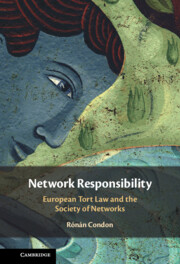
-
Select format
-
- Publisher:
- Cambridge University Press
- Publication date:
- July 2022
- July 2022
- ISBN:
- 9781009051972
- 9781316512005
- 9781009054898
- Dimensions:
- (229 x 152 mm)
- Weight & Pages:
- 0.5kg, 242 Pages
- Dimensions:
- (229 x 152 mm)
- Weight & Pages:
- 242 Pages
- Subjects:
- Law, Private Law, Jurisprudence
You may already have access via personal or institutional login- Subjects:
- Law, Private Law, Jurisprudence
Book description
The contemporary landscape of transnational political economy is dominated by networks. Public and private networks, and networks that combine public and private actors, cross borders, exert regulatory power and their activities often harm third parties. However, tort law as a traditional source of remediation for third party harms appears impotent when faced with the problem of regulating the 'society of networks'. This book, using a systems theory framework, retraces the emergence of tort law in modernity and highlights how two models of normative ascription - personal responsibility and organizational liability - have come to shape existing tort law's ambivalence towards network phenomena. This book breaks new ground by leaving behind the national law 'frame of reference', drawing on the conceptual promise of EU law to develop a concept of 'network responsibility' for a network society and lays the foundations of a tort law for the 21st century.
Contents
Metrics
Altmetric attention score
Full text views
Full text views help Loading metrics...
Loading metrics...
* Views captured on Cambridge Core between #date#. This data will be updated every 24 hours.
Usage data cannot currently be displayed.
Accessibility standard: Unknown
Why this information is here
This section outlines the accessibility features of this content - including support for screen readers, full keyboard navigation and high-contrast display options. This may not be relevant for you.
Accessibility Information
Accessibility compliance for the PDF of this book is currently unknown and may be updated in the future.


